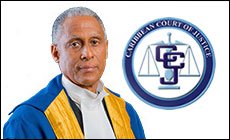PORT OF SPAIN, Trinidad (CMC) — The Caribbean Court of Justice (CCJ) says it will give an opinion “within a reasonable time” as it concluded hearing arguments in the request for an advisory opinion by the Caribbean Community (CARICOM) that could have implications for the CARICOM Single Market and Economy (CSME) that allows for the free movement of goods, skills, labour and services across the region.
The CCJ, which was established in 2003, replacing the London-based Privy Council as the region’s final court for some states, also acts as an international tribunal interpreting the treaty that governs the 15-member regional integration grouping.
It had over the past two days heard arguments from attorneys representing Antigua and Barbuda, Barbados, Grenada, St Kitts-Nevis, the CARICOM Secretariat as well as law lecturers of the University of the West Indies (UWI).
The request for the advisory opinion by CARICOM, is pursuant to Article 212 of the Revised Treaty of Chaguaramas (RTC) which states, “the Court shall have exclusive jurisdiction to deliver advisory opinions concerning the interpretation and application of the treaty”, and that “advisory opinions shall be delivered only at the request of member states parties to a dispute or the community”.
In thanking the lawyers for their presentation, the CCJ President, Justice Adrian Saunders said “we are going to consider all of them of course and I won’t be able to give you a time now when we will give the decision, but I could tell you it will be given in a reasonable time”.
At the centre of the request for the opinion from the CCJ, is the decision taken by CARICOM leaders at the 18th special meeting where they had agreed to extend the category of skilled nationals pursuant to article 46 of the RTC to include agricultural workers and security guards.
Antigua and Barbuda, as well as St Kitts-Nevis were granted an “opt out” of obligations from the decisions of the Conference to extend the category.
Dr Corita Babb-Schaefer, who is the lead attorney for the Guyana-based CARICOM Secretariat, had indicated that the principle of non-reciprocity would not enable nationals of those member states “that opt out of a decision under article 27 (4) to nevertheless derive the benefits of the decision as the effect of a knockout is to suspend the operation of articles 7, 8 and 9 of the Revised Treaty of Chaguaramas”.
Earlier, during the proceedings, the St Kitts-Nevis Solicitor General, Simone Bullen Thompson , said that the RTC recognises that “all states are not on equal footing “ and that the lesser developed countries are entering the CSME at a disadvantage “by reason of structure, size and vulnerability of the economies.”
“Certain matters that have contributed to their vulnerabilities have not changed, size of country has not changed, those things remain the same. We still remain vulnerable to shocks and all those issues that will necessarily affect a small territory.”
She said while many territories had made “significant strides, those issues still remain.”

